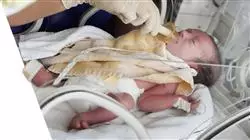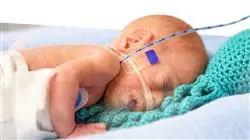University certificate
The world's largest faculty of medicine”
Introduction to the Program
A 100% online Postgraduate diploma that provides you with the current clinical criteria in Neonatal Nutrition over 6 months"

The evolution of research on neonatology and the approach to the main pathologies in premature patients has highlighted the benefits of breast milk, leading to the inclusion of milk banks in hospitals. In parallel, the study of the use of probiotics in patients with Digestive Disorders and the early detection of various Endocrine and Oncological pathologies has continued.
A wide field of action that leads the professionals of the Neonatology Units to keep abreast of the most relevant advances in this increasingly valued specialty. In this sense, TECH has created this University Expert in Neonatal Nutrition that takes the graduate through a 6-month intensive updating course.
A program that will lead students to deepen in the existing diagnostic and therapeutic procedures in Metabolopathies, Neuroblastomas, Wilms Tumor or Teratomas. The most recurrent digestive pathologies in neonates such as gastroesophageal reflux, esophageal atresia or necrotizing enterocolitis will have a special incidence in this program. For this purpose, it has advanced pedagogical tools based on video summaries of each topic, videos in detail, specialized readings and case studies that you can access comfortably from any digital device with an Internet connection.
Likewise, thanks to the Relearning method, consisting of the continuous reiteration of key concepts throughout the academic itinerary, students will consolidate the program in a much simpler way and reduce the long hours of memorization.
Undoubtedly, an ideal opportunity to update your knowledge through a university certification that has all the ingredients that a specialist needs to study it and make your daily responsibilities compatible with a unique academic option.
You have the latest information on the use of probiotics in neonatal patients with Digestive Disorders"
This Postgraduate diploma in Neonatal Nutrition contains the most complete and up-to-date scientific program on the market. The most important features include:
- The development of practical cases presented by experts in Pediatrics and Neonatology
- The graphic, schematic, and practical contents with which they are created, provide scientific and practical information on the disciplines that are essential for professional practice
- Practical exercises where self-assessment can be used to improve learning
- Its special emphasis on innovative methodologies
- Theoretical lessons, questions to the expert, debate forums on controversial topics, and individual reflection assignments
- Content that is accessible from any fixed or portable device with an Internet connection
With this Postgraduate diploma you will be aware of the new indications for neuroprotection in the premature newborn"
The program’s teaching staff includes professionals from sector who contribute their work experience to this educational program, as well as renowned specialists from leading societies and prestigious universities.
Its multimedia content, developed with the latest educational technology, will provide the professional with situated and contextual learning, i.e., a simulated environment that will provide an immersive education programmed to learn in real situations.
The design of this program focuses on Problem-Based Learning, by means of which the professional must try to solve the different professional practice situations that are presented throughout the academic course. For this purpose, the student will be assisted by an innovative interactive video system created by renowned experts.
Thanks to the Relearning system, you will not have to dedicate many hours to study and memorization"

You will be able to perform a detailed update of your knowledge on the most important Digestive Pathologies in neonates"
Why study at TECH?
TECH is the world’s largest online university. With an impressive catalog of more than 14,000 university programs available in 11 languages, it is positioned as a leader in employability, with a 99% job placement rate. In addition, it relies on an enormous faculty of more than 6,000 professors of the highest international renown.

Study at the world's largest online university and guarantee your professional success. The future starts at TECH”
The world’s best online university according to FORBES
The prestigious Forbes magazine, specialized in business and finance, has highlighted TECH as “the world's best online university” This is what they have recently stated in an article in their digital edition in which they echo the success story of this institution, “thanks to the academic offer it provides, the selection of its teaching staff, and an innovative learning method aimed at educating the professionals of the future”
A revolutionary study method, a cutting-edge faculty and a practical focus: the key to TECH's success.
The most complete study plans on the university scene
TECH offers the most complete study plans on the university scene, with syllabuses that cover fundamental concepts and, at the same time, the main scientific advances in their specific scientific areas. In addition, these programs are continuously being updated to guarantee students the academic vanguard and the most in-demand professional skills. In this way, the university's qualifications provide its graduates with a significant advantage to propel their careers to success.
TECH offers the most comprehensive and intensive study plans on the current university scene.
A world-class teaching staff
TECH's teaching staff is made up of more than 6,000 professors with the highest international recognition. Professors, researchers and top executives of multinational companies, including Isaiah Covington, performance coach of the Boston Celtics; Magda Romanska, principal investigator at Harvard MetaLAB; Ignacio Wistumba, chairman of the department of translational molecular pathology at MD Anderson Cancer Center; and D.W. Pine, creative director of TIME magazine, among others.
Internationally renowned experts, specialized in different branches of Health, Technology, Communication and Business, form part of the TECH faculty.
A unique learning method
TECH is the first university to use Relearning in all its programs. It is the best online learning methodology, accredited with international teaching quality certifications, provided by prestigious educational agencies. In addition, this disruptive educational model is complemented with the “Case Method”, thereby setting up a unique online teaching strategy. Innovative teaching resources are also implemented, including detailed videos, infographics and interactive summaries.
TECH combines Relearning and the Case Method in all its university programs to guarantee excellent theoretical and practical learning, studying whenever and wherever you want.
The world's largest online university
TECH is the world’s largest online university. We are the largest educational institution, with the best and widest online educational catalog, one hundred percent online and covering the vast majority of areas of knowledge. We offer a large selection of our own degrees and accredited online undergraduate and postgraduate degrees. In total, more than 14,000 university degrees, in eleven different languages, make us the largest educational largest in the world.
TECH has the world's most extensive catalog of academic and official programs, available in more than 11 languages.
Google Premier Partner
The American technology giant has awarded TECH the Google Google Premier Partner badge. This award, which is only available to 3% of the world's companies, highlights the efficient, flexible and tailored experience that this university provides to students. The recognition as a Google Premier Partner not only accredits the maximum rigor, performance and investment in TECH's digital infrastructures, but also places this university as one of the world's leading technology companies.
Google has positioned TECH in the top 3% of the world's most important technology companies by awarding it its Google Premier Partner badge.
The official online university of the NBA
TECH is the official online university of the NBA. Thanks to our agreement with the biggest league in basketball, we offer our students exclusive university programs, as well as a wide variety of educational resources focused on the business of the league and other areas of the sports industry. Each program is made up of a uniquely designed syllabus and features exceptional guest hosts: professionals with a distinguished sports background who will offer their expertise on the most relevant topics.
TECH has been selected by the NBA, the world's top basketball league, as its official online university.
The top-rated university by its students
Students have positioned TECH as the world's top-rated university on the main review websites, with a highest rating of 4.9 out of 5, obtained from more than 1,000 reviews. These results consolidate TECH as the benchmark university institution at an international level, reflecting the excellence and positive impact of its educational model.” reflecting the excellence and positive impact of its educational model.”
TECH is the world’s top-rated university by its students.
Leaders in employability
TECH has managed to become the leading university in employability. 99% of its students obtain jobs in the academic field they have studied, within one year of completing any of the university's programs. A similar number achieve immediate career enhancement. All this thanks to a study methodology that bases its effectiveness on the acquisition of practical skills, which are absolutely necessary for professional development.
99% of TECH graduates find a job within a year of completing their studies.
Postgraduate Diploma in Neonatal Nutrition
Adequate neonatal nutrition is a crucial aspect in the care of newborns, since, it influences their growth, development and long-term health. At TECH Global University we have developed a Postgraduate Diploma in Neonatal Nutrition, which provides professionals with the necessary tools to understand and apply the principles of nutrition in this vital stage. This course covers topics such as breastfeeding, complementary feeding, specific nutritional requirements of premature and low birth weight newborns; as well as the identification and management of the most common nutritional complications in neonates. In addition, the importance of a multidisciplinary, evidence-based approach to neonatal nutritional care is emphasized.
In our online program, participants will be provided with updated materials and practical activities that will allow them to apply the knowledge acquired in their daily clinical practice. It will also encourage critical analysis of the scientific literature and provide a comprehensive approach to the assessment, diagnosis and nutritional treatment of neonates. Health professionals who complete this course will be trained to provide specialized and quality care to newborns, thereby contributing to improve the health and well-being of this vulnerable population.







